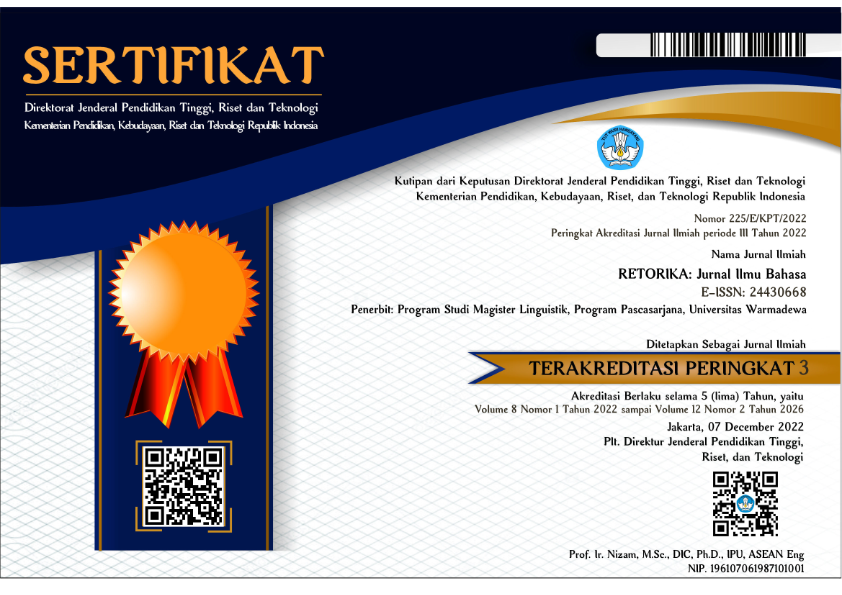Teaching Procedural Texts: An Eco-Linguistics Perspective
Abstract
The Curriculum 2013expects the students to possess both academic achievement and noble characters. Environmental awareness is one of noble characters proposed by The Curriculum 2013that relates to the eco-linguistics as an interdisciplinary science which involves ecology and linguistics. The objective of this study is to examine the effectiveness of teaching text in the light of eco-linguistics perspective to teach procedural text and recycling garbage. This study employed a mixed method research design. The quantitative method (one group pretest-posttest design of pre-experimental research) is concerned with the improvement assessment of writing procedural text while the qualitative one (questionnaire) was dealt with the investigation of students’ knowledge and response about recycling garbage. The research subjects were one class of Junior High School consisting of 32 students taken by purposing sampling. A scoring system of assessing writing proposed by The Curriculum 2013was used in this study. While the instrument to assess the students’ knowledge and response to recycling garbage, a closed question type of questionnaire was applied. The results showed that there is a significant improvement in students writing from 76,72 (pre-test) to 80,47 (post-test). The results of questionnaire also revealed that the students positively respond to the conducted teaching and they have learnt recycling garbage.
References
Abbaszadeh, Z. (2013). Genre-based approach and second language syllabus design. Procedia-Social and Behavioral Sciences, 84, 1879–1884. Retrieved from https://core.ac.uk/download/pdf/82309341.pdf
Anderson, M., & Anderson, K. (1997). Text Types in English. South Melbourne: Macmillan Education. Retrieved from https://trove.nla.gov.au/work/8428269?q&sort=holdings+desc&_=1586916528067&versionId=29283975
Bhatia, V. K. (1991). A genreâ€based approach to ESP materials. World Englishes, 10(2), 153–166. Retrieved from https://www.researchgate.net/publication/227769195_A_genre-based_approach_to_ESP_materials
Bryman, A. (2016). Social Research Methods (5th ed.). Oxford: Oxford University Press.
Campbell, R., & Green, D. (2006). Literacies and learners. Current perspectives. (3rd ed.). New South Wales: Pearson Education Limited. Retrieved from https://catalogue.nla.gov.au/Record/3601533
Creswell, J. W., & Guetterman, T. C. (2019). Educational Research: Planning, Conducting, and Evaluating Quantitative and Qualitative Research, 6th Edition. Upper Saddle River: Pearson Prentice Hall. Retrieved from https://eric.ed.gov/?id=ED594549
Derewianka, B. (1990). Exploring how texts work. Rozelle. New South Wales: Primary English Teaching Association. Retrieved from https://catalogue.nla.gov.au/Record/1757085
Fill, A., & Muhlhausler, P. (2001). The Ecolinguistics Reader Language, Ecology, and Environment. London: Continuum. Retrieved from https://epdf.pub/the-ecolinguistics-reader-language-ecology-and-environment.html
Gerot, L., & Wignell, P. (1994). Making sense of functional grammar: An introductory workbook. Queensland: Antipodean Educational Enterprises. Retrieved from https://www.goodreads.com/book/show/9815147-making-sense-of-functional-grammar-an-introductory-workbook
Hammond, J., Burns, A., Joyce, H., Brosnan, D., & Gerot, L. (1992). English for specific purposes: A handbook for teachers of adult literacy. Sydney: National Centre for English Language Teaching and Research. Retrieved from https://catalogue.nla.gov.au/Record/2615149
Howatt, A. P. R., & Widdowson, H. G. (2004). A History of ELT, Second Edition. Oxford: Oxford University Press. Retrieved from https://books.google.co.id/books/about/A_History_of_ELT_Second_Edition.html?id=g2e7iw_F-ZcC&redir_esc=y
Hyland, K. (2003). Genre-based pedagogies: A social response to process. Journal of Second Language Writing, 12(1), 17–29. Retrieved from https://doi.org/10.1016/S1060-3743(02)00124-8
Hyland, K., & Hyland, F. (2006). Contexts and issues in feedback on L2 writing: An introduction. Cambridge: Cambridge University Press. Retrieved from https://www.researchgate.net/publication/285659628_Contexts_and_issues_in_feedback_on_L2_writing_An_introduction
Iskandarwasid. (2007). Strategi Pembelajaran Bahasa. Bandung: Rineka Cipta.
Kentjono, D. (1982). Dasar-dasar Linguistik. Jakarta: Fakultas Sastra Universitas Indonesia.
Kridalaksana, H. (1984). Kamus Linguistik. Edisi kedua. Jakarta: Gramedia Pustaka Utama.
Maeta, H., Sasada, T., & Mori, S. (2015). A Framework for Procedural Text Understanding. In Proceedings of the 14th International Conference on Parsing Technologies (pp. 50–60). Association for Computational Linguistics. Retrieved from https://www.aclweb.org/anthology/W15-2206
Maharani, M. M. (2017). The Application Of Indirect Feedback To Improve Students’ Paragraph Writing. Edulite: Journal of English Education, Literature and Culture, 2(2), 389–404. Retrieved from http://dx.doi.org/10.30659/e.2.2.389-404
McCutchen, D. (2011). From novice to expert:Implications of language skills and writing-relevant knowledge for memory during the development of writing skill. Journal of Writing Research, 3(1), 51–68. Retrieved from http://dx.doi.org/10.17239/jowr-2011.03.01.3
Paltridge, B. (2001). Genre and the Language Learning Classroom. Michigan, United States of America: Michigan Publishing. Retrieved from https://www.press.umich.edu/23749
Sari, H. I. (2016). Errors In Using English As Classroom Language Committed By The Ict Teacher Of Smp Negeri 2 Semarang. Edulite: Journal of English Education, Literature and Culture, 1(1), 41–56. Retrieved from http://dx.doi.org/10.30659/e.1.1.41-56
Sayukti, N. K. H., & Kurniawan, E. (2018). An Analysis of Student’s Recount Text in Systemic Functional Linguistic Perspectives. RETORIKA: Jurnal Ilmu Bahasa, 4(1), 53–59. Retrieved from https://doi.org/10.22225/jr.4.1.466.53-59
Swales, J. M. (1990). Genre analysis: English in academic and research settings. Cambridge: Cambridge University Press. Retrieved from https://doi.org/10.1075/z.184.513swa
Copyright (c) 2020 RETORIKA: Jurnal Ilmu Bahasa

This work is licensed under a Creative Commons Attribution-ShareAlike 4.0 International License.
This journal provides immediate open access to its content on the principle that making research freely available to the public supports a greater global exchange of knowledge.
All articles published Open Access will be immediately and permanently free for everyone to read and download. We are continuously working with our author communities to select the best choice of license options, currently being defined for this journal as follows: Creative Commons-Non Ceomercial-Attribution-ShareAlike (CC BY-NC-SA)
 Abstract viewed = 395 times
Abstract viewed = 395 times
 PDF downloaded = 744 times
PDF downloaded = 744 times

2.png)














